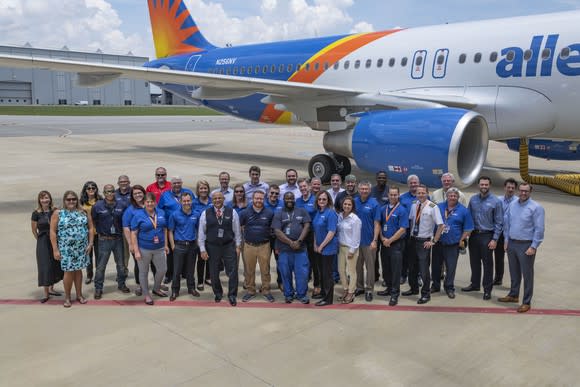Is This Budget Airline Diversifying or Just Losing Focus?
For most of its roughly two-decade history, Allegiant Travel (NASDAQ: ALGT) has presented itself as being more than just an airline. While Allegiant Air is one of the three big ultralow-cost carriers in the U.S., the company strives to sell complete travel packages, rather than just airline tickets. This has helped it develop a stream of high-margin commission revenue selling hotels, rental cars, and various vacation experiences.
However, Allegiant has recently moved to further expand its operations into resort development and operations, hotel management, golf, and even local game and family entertainment centers.

Image source: Airbus.
Allegiant isn't the first airline to branch out into other businesses -- for example, Delta Air Lines (NYSE: DAL) has operated an oil refinery since 2012. But while Allegiant's new strategy could prove lucrative if everything goes well, it exposes shareholders to too many risks.
Allegiant has been looking to diversify
The first sign that Allegiant wanted to move beyond the airline business came two years ago, when it appointed John Redmond -- a veteran of gaming and resort giant MGM Resorts International -- as its new president. A year later, it officially announced its new Sunseeker Resorts venture.
Allegiant is starting the Sunseeker business by building a single resort on a 20-acre waterfront parcel on the west coast of Florida. While the plan has evolved over time, the company currently expects the resort to have more than 500 hotel rooms, along with 180 hotel-condo units that could either be sold as condos or rented for both short-term and long-term stays. The resort will feature numerous dining and retail options and various other amenities. Over time, Allegiant envisions building more resorts and offering management services to other hotel owners.
So far, Allegiant has spent $46 million on capital expenditures related to the new resort. That includes its recent purchase of an existing golf club near the Sunseeker property. It expects to spend another $420 million over the next two years to get the resort ready to open by October 2020.

Allegiant plans to spend nearly $500 million in total to open its first resort. Image source: Sunseeker Resorts.
Part of the rationale for opening a resort is opportunistic. The site is near Punta Gorda Airport in Florida, a growing leisure destination for Allegiant Air. Moreover, there is a shortage of hotel rooms in the area. There is also a strategic aspect to the move. Allegiant believes that its large existing customer base and distribution capabilities will enable it to create a more profitable hotel model by not relying on third-party distributors like online travel agencies.
The latest new venture is ready to launch
While the Sunseeker Resorts project is by far Allegiant's biggest move beyond its core airline business, it is also investing in other new lines of business. For example, it has acquired Teesnap, which offers golf course management software designed to modernize the golf industry's IT capabilities.
Now Allegiant is looking to launch a chain of family entertainment centers featuring laser tag, go-karts, bowling, arcade games, food, and more. The first G4 Complete Entertainment (G4CE) center is set to open in Clearfield, Utah, before year-end, and the company plans to open at least three more locations next year.
One goal of the project is to take advantage of abundant big-box retail space to offer consumers new leisure activities near where they live. But the company also hopes to collect customers' email addresses to enable direct marketing of Allegiant flights and vacation packages later on.
A risky transition
Most pundits were skeptical of Delta's decision to buy the Trainer oil refinery in 2012, seeing it as an unnecessary distraction that management wasn't fully equipped to handle. But at least in that case, the new business was small relative to the company as a whole -- the refinery accounts for just a few hundred of Delta's 87,000 employees -- and not customer-facing.
Even then, the move into the refinery business wasn't as successful as initially expected. As a result, Delta Air Lines is now looking to sell a joint venture interest in the facility to a partner that would take on responsibility for marketing all of the refinery's products other than jet fuel.
By contrast, Allegiant has much grander ambitions to transform itself into a diversified leisure company. Yet its smaller initiatives like Teesnap and G4CE aren't likely to move the needle, while the Sunseeker Resorts project is a big gamble.
Right now, the superstrong economy means that hotel occupancy has surged and room rates are sky-high. But when the economy slows, occupancy levels are likely to fall, particularly at hotels that cater to lots of business travelers. While Sunseeker Resorts will mainly serve the leisure market, it could still be forced to reduce its room rates to compete with other hotels that slash their prices in order to replace lost business travel demand with leisure travelers.
CEO Maury Gallagher is a smart entrepreneur who practically built Allegiant Travel up from scratch. Perhaps his "Allegiant 2.0" vision of a fully integrated leisure company will prove to be an astute strategic pivot. But I'm inclined to wait for clear signs of success -- particularly in a recessionary scenario -- before investing in Allegiant Travel.
More From The Motley Fool
Adam Levine-Weinberg owns shares of Delta Air Lines. The Motley Fool owns shares of Delta Air Lines. The Motley Fool has a disclosure policy.
